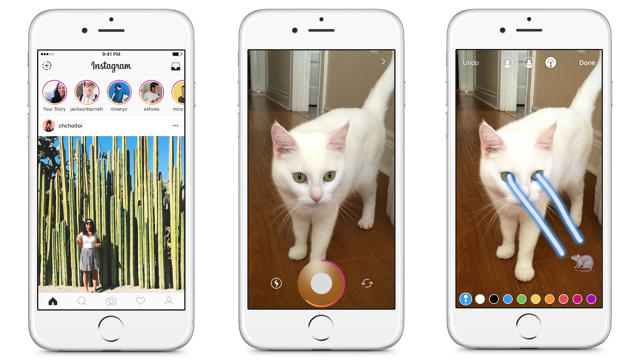Clone Wars: Why Instagram Will Legally Get Away With Copying Snapchat Stories
In the social media space, drawing inspiration from other apps is par for the course. Twitter, which boasted a real-time feed for years, recently took a page from the Facebook playbook and introduced an algorithmic feed. Instagram and Facebook both use hashtags, which were first used by Twitter. Two years ago, Facebook tried to capitalize on the popularity of Snapchat by launching the Slingshot app—which was actually Facebook’s second attempt to shamelessly copy Snapchat.
With the debut of Instagram Stories, the Facebook-owned photo-sharing app may have perfected cloning: This is an impressive re-creation of Snapchat Stories, albeit against the sparse, white backdrop of Instagram’s app. (As it turns out, Facebook itself came up with yet another Snapchat knockoff, a feature called Quick Updates—but the company won’t be releasing it.) And barring the fun Lenses that are specific to Snapchat, Instagram may have done it even better.
But wait. This can’t be right! How can Instagram peddle what appears to be a blatant rip-off? Speaking to TechCrunch, Instagram CEO Kevin Systrom went so far as to give full credit to Snapchat, noting that he thinks of Stories as a “format”—like the algorithmic feed or hashtags—and that the real innovation is how well you “put your own spin on it” when implementing the same idea.
Legally speaking, there’s nothing wrong with this. Duke law professor Arti Rai says that copyright and trademark laws do not protect the adoption of a feature like Snapchat Stories given the inherent differences in the interfaces of the two apps. “It’s okay to take somebody’s idea so long as your expression of it is different,” Rai says. Ideas are a nebulous thing; though they can be protected by patents, Rai notes that they cannot be too “abstract.”

So while Snapchat has patented its own execution of “ephemeral message galleries”, the concept of Stories cannot really be patented. As digital strategy firm PointSource’s chief digital officer Stephanie Trunzo told Fast Company, the idea of sharing a “status” did not originate with Snapchat:
The idea of a personal status, at its core, is a common social paradigm, not owned by any one platform. Facebook called it a status, represented initially as text; Snapchat called this function a story, represented as a short video clip.

All Snapchat did was take the idea of a status and tack on the gimmick of making it temporary—after which came dog lenses and geofilters and all the other things that will keep people coming back to Snapchat, Instagram Stories be damned.
Perhaps the problem is that intellectual property law hasn’t quite caught up to the pitfalls of tech innovation. As intellectual property lawyer Jeremy Harris told TechWorld, Snapchat wouldn’t have a case against Instagram “unless they are copying the underlying source code, or perhaps the exact way it looks.” Does this mean that, in the realm of software, it’s a free-for-all—so long as you don’t lift exact code from a competitor?
For now, Instagram can rest assured that people will definitely use Instagram Stories—be it for the superior design or ease of discovery—and that sharing on Instagram is soon to be on the upswing, if it isn’t already. And isn’t that all that really matters?
Fast Company , Read Full Story
(79)













